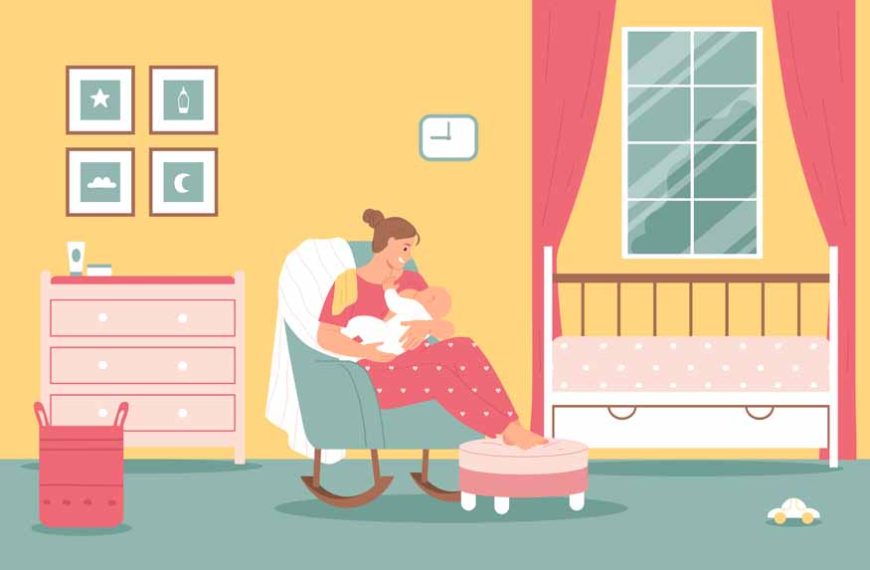Welcoming a new addition to the family can be an exhilarating experience. It comes with its own set of challenges. One of the most significant adjustments is figuring out sleeping arrangements, especially when it involves the parents sharing a room with toddler and baby. Creating a safe, cosy, and practical environment requires careful planning and essential baby care equipment. This definitive manual aims to guide parents through this transition with tips for sharing room with baby, offering insights and a list of indispensable gear to ensure a harmonious coexistence with their baby in the same room.
Advantages of Room Sharing With Babies
- Facilitates Easy Breastfeeding:
- Facilitates Easy Change of Diapers at Night:
- Prevents Night Crying That Wakes Everyone in the House:
- Being Close Enough to Check on Baby Frequently:
- Promotes Emotional Closeness:
If the mother is in the phase of nursing the baby, sharing a common room is helpful in nursing the baby especially at night without the baby or the mother waking up completely.
The parents can easily change the diaper of the baby while the baby is still half-asleep without having to walk across rooms.
If the baby is hungry and crying, it is easier to breastfeed the baby and put them back to sleep right in the room.
The American Academy of Pediatrics (AAP) recommends sharing the same room with the baby until at least six months of age. It reduces the risk of sudden infant death syndrome (SIDS). If there is a shared room, the parents can frequently check on the baby at night and go back to sleep peacefully. They can also tend to the baby if there is any emergency arousing at night.
The parents can feel at ease knowing the baby is safe around them. The six months also feel fleeting, so having the baby in the room promotes emotional satisfaction because this limited time is very precious.
Creating a Safe Sleep Environment
A safe sleep environment is equally important for everyone. Before we explore the sharing room with the baby organising aspect, it is crucial to explore a safe sleep environment.
- Choose a Safe Sleeping Surface:
- Keep the Crib Bare:
- Maintain Optimal Room Temperature:
- Create a Comfortable Ambience:
Invest in a firm and flat crib mattress and adhere to the safety standards. It will reduce the risk of suffocation. Avoid soft bedding, pillows, stuffed animals, and bumpers inside the crib.
A bare crib will minimise potential hazards. Use a fitted crib sheet and a sleep sack or wearable blanket to keep your baby warm without any loose bedding.
Aim for a comfortable room temperature throughout for the baby’s wellbeing. Keep the room temperature typically between 20-22 degree celsius. Overheating potentially increases the risk of SIDS.
Soft lighting and comforting or soothing sounds are good for the baby. White noise machines can also be helpful in lulling the baby to sleep.
Essential Baby Care Equipment for Room Sharing
It is important to have the essential baby care equipment for room sharing with parents.
- Crib or Bassinet:
- Baby Monitor:
- Changing Station:
- Nursing Chair or Glider:
- Storage Solutions:
- Blackout Curtains or Shades:
- Nightlight:
A safe sleeping space for the baby is fundamental. Make sure to invest in a good crib or bassinet which meets the safety standards for babies. Ensure ample space for the baby to be able to sleep comfortably and peacefully. Nowadays one can also find co-sleepers or bedside sleepers, where the crib is attached to the bed. It helps to keep the baby close while the parents have their own bed to sleep in. It is also a good choice in the aspect of parents sharing a small room with baby ideas.
Opt for a reliable baby monitor. It should be equipped with video and sound capabilities. This will allow the parents to keep an eye and ear on the baby sleeping in the crib, anytime of the day and night.
A dedicated changing area should be present within the room. It should be equipped with a changing pad, diapers, wipes, and diaper disposal unit. It will help streamline night-time diaper changes.
A nursing chair or glider is essential for the comfort of the mother as well as the baby. For breastfeeding mothers, having a comfortable nursing chair or glider facilitates easy late-night feeding sessions. It promotes a calm and cosy environment.
Invest in storage bins, baskets, or shelves depending on the size of the room and interior decor preference. They will help to organise and store baby essentials like clothes, diapers, wipes, and lotions. It will help the room to be clutter-free and tidy.
Controlling the room’s light conditions helps establish a conducive sleep environment for both the baby and the parents. It will promote longer and more restful sleep which is equally important at this stage for both the parties involved.
A soft, dim nightlight can help assist a parents’ check-ins with the baby without disrupting the baby’s sleep completely.
Practical Tips for Room Sharing Success
- Establish a Routine:
- Create Separate Spaces:
- Communicate and Coordinate:
- Prioritise Safety Checks:
- Take Care of Your Own Sleep:
Consistency is key. Create a bedtime routine that signals to your baby that it is time to sleep. One can use methods like bath, book, and bedtime feeding to communicate that.
Define distinct areas within the room to sleep, change, and feed to maintain organisation and a clear separation of activities.
If the parents are sharing the room, communicate openly about nighttime responsibilities and coordinate shifts for feeding and soothing the baby.
Make it a habit to regularly inspect the crib, monitor, and other equipment for any wear, tear, or hazards to ensure a safe sleeping environment.
Self-care is crucial for parents. One can not pour from an empty cup, as they say. Nap when the baby naps and try to prioritise your own rest to manage the challenges of room sharing more effectively.
Sharing a room with the baby requires careful planning, adherence to safety guidelines, and investment in essential equipment. By creating a comfortable sleep environment, following practical tips for sharing a room with a baby, and investing in necessary gear, parents can navigate the joys and challenges of room sharing with the newborn more effectively. Each baby is unique, so it is important to adjust the strategies and equipment based on the baby’s individual needs. It is time for some beautiful memories in the making!
For more information, visit EuroKids, or visit a centre nearest to you.
















